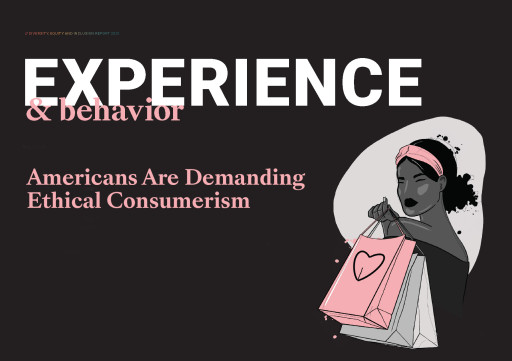NEW YORK, August 30, 2023 (Newswire.com) - Three in 10 (31 percent) American consumers will boycott brands that are not committed to diversity, equity, and inclusion (DE&I) and this number increases to nearly four in 10 (37 percent) among under-represented U.S. consumers, according to a new, eye-opening, investigation into intersectionality in brand marketing by leading global market research agency Savanta.
The report also discovered that Gen-Z, along with LGBTQIA+ and under-represented U.S. communities, are championing for ethical consumerism with 37 percent of these consumers prepared to shop elsewhere to ensure they are not contributing to behaviors or causes that they disagree with.
Savanta's "Understanding Bias, Discrimination, and Its Impact on Society," researches the lived experiences of nearly 5,000 participants across the U.S. and Europe, to understand the discrimination felt by consumers, in an effort to raise awareness and fuel inclusivity from brands when marketing to their audiences.
According to Sadia Corey, vice president of Savanta's client development, the goal of the study was to "recognize the diverse ways groups are marginalized, so that brands can enhance authenticity and foster genuine connections with consumers."
Brand DE&I Efforts Impact on Consumer Behavior
In today's tight economy, price still reigns supreme when making purchasing decisions, particularly among women and Baby Boomers in all countries, with 73 percent reporting that value is the biggest buying factor. This is, naturally, followed by quality and convenience. However, Savanta's report shows that Americans' pursuit of ethical consumerism is gaining momentum. In fact, 31 percent of U.S. shoppers said that they will not buy from a brand that is not committed to DE&I and this number increases to 37 percent among under-represented communities and Gen-Z consumers.
Time to Take a Stand?
There is a perception that brands need to voice an opinion when it comes to important social issues. Remaining silent at important social moments has both pros and cons, but for the majority of consumers, it appears that it will have no effect on how they view the company. In fact, more than half (53 percent) of all consumers surveyed said that they would think neither positively nor negatively about a brand if it did not speak out.
However, "Understanding Bias, Discrimination, and Its Impact on Society" found that brands that take a stand do matter to many groups in America. With 28 percent of the LGBTQIA+ community, 31 percent of gender non-conformists, and 27 percent of those from the under-represented community reporting that their perception of a silent brand would be negatively affected, it can be determined that the old adage of "treat others as you would want to be treated" resonates with those who may have experienced discrimination, and it means that they want to support people like them.
How are U.S. Shoppers Showing Support?
Consumers are demonstrating their allegiance to the brands and stores that they align with in meaningful ways. In addition to shopping local, which 45 percent of the LGBTQIA+ community prefers to do, those from the under-represented U.S. community are significantly more likely to shop at minority-owned businesses than White or Caucasian people (35 percent versus 20 percent), as are those from within the LGBTQIA+ community (33 percent).
"As consumers increasingly demand authentic and inclusive brand experiences, those brands that fail to recognize the importance of intersectionality risk losing relevance, market share, and the opportunity to create a lasting impact," said Corey.
Methodology
Savanta conducted research for the report between May and June 2023. In total, 4,973 adults were surveyed across six countries, 29 percent of whom were based in the U.S. 53 percent identified as female, 45 percent identified as male, and 2 percent identified as gender non-conforming. Four generations were surveyed, including 17 percent Gen Z (age 18-25), 30 percent Millennial (age 26-40), 31 percent Generation X (age 41-59), and 22 percent Boomer II (age 60+). 85 percent surveyed identified as heterosexual, 11 percent as LGBTQIA+, and 4 percent preferred not to say. Race was reported as 74 percent White/Caucasian and 28 percent BIPOC in the U.S. and U.K. In addition to the quantitative survey conducted across markets, the conversational insights platform Voxpopme was used to collect qualitative data through 155 video responses to a variety of questions. This mix of both qualitative and quantitative research helped inform an array of rich findings on the topics Savanta focused on. Note: Ethnicity was only identified in the U.K. and U.S. due to Europe's ban on data collection by race.
To learn more about "Understanding Bias, Discrimination, and Its Impact on Society," or to view the report, visit Savanta Report.
Contact Information:John Whittaker
[email protected]
+1 347.533.1463
Nicolette Sheil
[email protected]
1 347 533 1463
Original Source: Americans Are Demanding Ethical Consumerism, According to Ground-Breaking New Study

